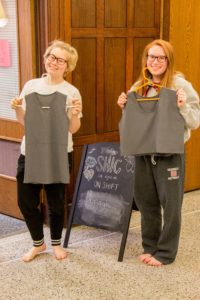By Louise Carhart
carhartl17@grinnell.edu
The Sexual Health Information Center (SHIC) has recently begun offering binders at a discounted rate, in an effort to make transgender inclusivity a priority at Grinnell. SHIC is currently offering ten sizes of binders in two different lengths.

“Oftentimes you’re ordering these things online and you have no idea how it’s going to fit,” said Toby Baratta ’17, the Diversity and Outreach Coordinator (DOC). “If a binder is too tight, that can have some real health problems, especially if you’re binding for eight hours a day. There are already health problems there without adding on the wrong size.”
This new service is being offered at a highly discounted price. Because since SHIC became a part of the Student Government Association (SGA) last spring, its budget has increased and it can now order items wholesale and sell them at a steeply discounted price.
“The way it works is people can come here and try on the binders, we have a measuring tape and measuring charts, so they can size themselves if they want. They can go into the bathroom there, there is a gender inclusive one right next door, and try it on,” said Vivian Cheslack ‘19, a co-administrator at SHIC. “People are free to come, try it on. All our educators did a training with the Trans Advocacy Group about binder safety, as well as inclusive language and how to talk to people who might be uncomfortable with people who are cis.”
The addition of binders, which cost $10, represents an effort to move the center beyond just pleasure toys and condoms. As an information center, SHIC has traditionally stuck to information and resources regarding safe sex. In the past couple of months, this focus has shifted to include health services that are difficult or impossible to find on campus or in town. SHIC now offers products like menstrual cups, the current bestseller, and hopes to begin including more products that go beyond sex.
“In the past we’ve been focused more on pleasure toys, but I think this semester especially we’re moving towards more general sexual-related health,” Cheslack said. “We’re working more on the education and information side, and trans inclusivity is included with that. We’re hoping to make better connections with trans groups on campus as well, and asexual groups to try and expand SHIC beyond just sex and pleasure.”
The drive towards greater inclusivity and ensuring that every student feels safe and supported at Grinnell is important to the office of Diversity and Outreach as well. Schools around the nation have attempted to update and modernize their conceptions of gender and diversity, although this remains a large and ongoing task.
One fight that has become national news is the redefinition of gendered bathrooms as students have argued against the antiquated division that adheres to an outdated binary.
“It’s actually an archaic law that happened a long time ago. [Schools] were only having men’s bathrooms in spaces where people were working to discourage women from working, thus the law says you specifically need to have x number of male bathrooms and x number of women’s bathrooms in a space of a certain size,” Baratta said. “The way that’s been interpreted legally is if you make a bathroom gender neutral, it no longer counts as male or female. It doesn’t count. One of the things that’s been continually worked on is to get an exception for the College.”
This law only applies to bathrooms in academic buildings, which is why dorms can choose to label their bathrooms based on the occupants’ wants and needs. In addition, turnover in residence life jobs can complicate the process of making dorms more accessible and inclusive.

“There hasn’t been too much continuity on the subject,” Baratta said.
For now, SHIC and the DOC’s office are optimistic about their partnering and hope to see more improvements happen faster at Grinnell.
“[SHIC] is great because they’re good about coming and saying ‘this thing you’ve done is inaccessible, let’s figure out a way to make it more accessible, let’s find a way to have office hours in the Stonewall Resource Center to include North Campus,’” Baratta said.
One of the most resonant changes at SHIC began when educators were paid for the time they spend working at the center. Previously, this time was considered volunteer work and made it difficult for a large variety of students to apply and work for SHIC in a capacity to make major changes.
“My first semester at SHIC we were independent and then we started working with SGA. We can now get better products in more bulk. Most importantly, this is the first semester we’ve started paying educators,” Cheslack said. “When people are in the center it’s paid and our meetings are paid, which has made definitely a much bigger impact. It’s made the workers more passionate and it’s easier to allocate paid time, as opposed to volunteer time … Definitely, since we’ve started working with SGA, our presence on campus has increased, people are talking about us.”



















































